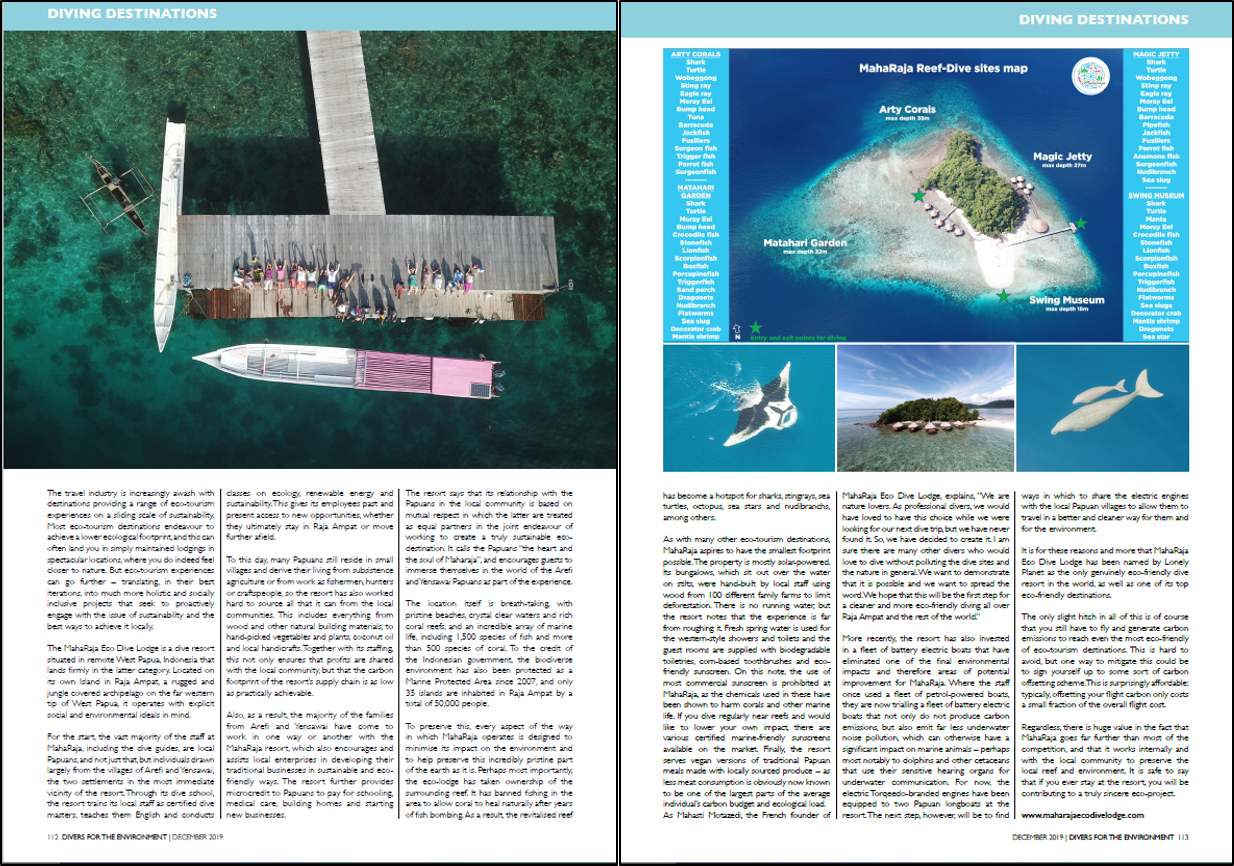It is safe to say that if you ever stay at MahaRaja, you will be contributing to a truly sincere eco-project.
“DIVERS FOR ENVIRONMENT” Magazine- December 2019 edition
Feature by JOHN BAMBRIDGE
The travel industry is increasingly awash with destinations providing a range of Eco-tourism experiences on a sliding scale of sustainability. Most Eco-tourism destinations endeavor to achieve a lower ecological footprint, and this can often land you in simply maintained lodgings in spectacular locations, where you do indeed feel closer to nature. But Eco-tourism experiences can go further – translating, in their best iterations, into much more holistic and socially inclusive projects that seek to proactively engage with the issue of sustainability and the best ways to achieve it locally.
The MahaRaja Eco Dive Lodge is a dive resort situated in remote West Papua, Indonesia that lands firmly in the latter category. Located on its own Island in Raja Ampat, a rugged and jungle covered archipelago on the far western tip of West Papua, it operates with explicit social and environmental ideals in mind.
For the start, the vast majority of the staff at MahaRaja, including the dive guides, are local Papuans, and not just that, but individuals drawn largely from the villages of Arefi and Yensawai, the two settlements in the most immediate vicinity of the resort. Through its dive school, the resort trains its local staff as certified dive masters, teaches them English and conducts classes on ecology, renewable energy and sustainability. This gives its employees past and present access to new opportunities, whether they ultimately stay in Raja Ampat or move further afield.
To this day, many Papuans still reside in small villages and derive their living from subsistence agriculture or from work as fishermen, hunters or craftspeople, so the resort has also worked hard to source all that it can from the local communities. This includes everything from wood and other natural building materials, to hand-picked vegetables and plants, coconut oil and local handicrafts. Together with its staffing, this not only ensures that profits are shared with the local community, but that the carbon footprint of the resort’s supply chain is as low as practically achievable.
Also, as a result, the majority of the families from Arefi and Yensawai have come to work in one way or another with the MahaRaja resort, which also encourages and assists local enterprises in developing their traditional businesses in sustainable and Eco-friendly ways. The resort further provides micro-credit to Papuans to pay for schooling, medical care, building homes and starting new businesses. classes on ecology, renewable energy and sustainability.
The resort says that its relationship with the Papuans in the local community is based on mutual respect in which the latter are treated as equal partners in the joint endeavor of working to create a truly sustainable eco-destination. It calls the Papuans “the heart and the soul of Maharaja”, and encourages guests to immerse themselves in the world of the Arefi and Yensawai Papuans as part of the experience.
The location itself is breath-taking, with pristine beaches, crystal clear waters and rich coral reefs, and an incredible array of marine life, including 1,500 species of fish and more than 500 species of coral. To the credit of the Indonesian government, the bio-diverse environment has also been protected as a Marine Protected Area since 2007, and only 35 islands are inhabited in Raja Ampat by a total of 50,000 people.
To preserve this, every aspect of the way in which MahaRaja operates is designed to minimize its impact on the environment and to help preserve this incredibly pristine part of the earth as it is. Perhaps most importantly, the Eco-lodge has taken ownership of the surrounding reef. It has banned fishing in the area to allow coral to heal naturally after years of fish bombing. As a result, the revitalized reef has become a hotspot for sharks, stingrays, sea turtles, octopus, sea stars and nudibranchs, among others.
As with many other eco-tourism destinations, MahaRaja aspires to have the smallest footprint possible. The property is mostly solar-powered. Its bungalows, which sit out over the water on stilts, were hand-built by local staff using wood from 100 different family farms to limit deforestation. There is no running water, but the resort notes that the experience is far from roughing it. Fresh spring water is used for the western-style showers and toilets and the guest rooms are supplied with biodegradable toiletries, corn-based toothbrushes and eco-friendly sunscreen. On this note, the use of most commercial sunscreen is prohibited at MahaRaja, as the chemicals used in these have been shown to harm corals and other marine life. If you dive regularly near reefs and would like to lower your own impact, there are various certified marine-friendly sunscreens available on the market. Finally, the resort serves vegan versions of traditional Papuan meals made with locally sourced produce – as less meat consumption is obviously now known to be one of the largest parts of the average individual’s carbon budget and ecological load.
As Mahasti Motazedi, the French founder of MahaRaja Eco Dive Lodge, explains, “We are nature lovers. As professional divers, we would have loved to have this choice while we were looking for our next dive trip, but we have never found it. So, we have decided to create it. I am sure there are many other divers who would love to dive without polluting the dive sites and the nature in general. We want to demonstrate that it is possible and we want to spread the word. We hope that this will be the first step for a cleaner and more eco-friendly diving all over Raja Ampat and the rest of the world.”
More recently, the resort has also invested in a fleet of battery electric boats that have eliminated one of the final environmental impacts and therefore areas of potential improvement for MahaRaja. Where the staff once used a fleet of petrol-powered boats, they are now trialing a fleet of battery electric boats that not only do not produce carbon emissions, but also emit far less underwater noise pollution, which can otherwise have a significant impact on marine animals – perhaps most notably to dolphins and other cetaceans that use their sensitive hearing organs for underwater communication. For now, the electric Torqeedo-branded engines have been equipped to two Papuan longboats at the resort. The next step, however, will be to find
ways in which to share the electric engines with the local Papuan villages to allow them to travel in a better and cleaner way for them and for the environment.
It is for these reasons and more that MahaRaja Eco Dive Lodge has been named by Lonely Planet as the only genuinely eco-friendly dive resort in the world, as well as one of its top eco-friendly destinations.
The only slight hitch in all of this is of course that you still have to fly and generate carbon emissions to reach even the most eco-friendly of eco-tourism destinations. This is hard to avoid, but one way to mitigate this could be to sign yourself up to some sort of carbon offsetting scheme. This is surprisingly affordable: typically, offsetting your flight carbon only costs a small fraction of the overall flight cost.
Regardless, there is huge value in the fact that MahaRaja goes far further than most of the competition, and that it works internally and with the local community to preserve the local reef and environment. It is safe to say that if you ever stay at the resort, you will be contributing to a truly sincere eco-project.



